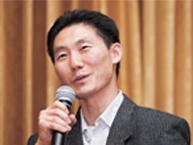APA Spotlight is a weekly interview of Asian Pacific Islander Americans (APIA) community leaders. It is a spotlight on individuals who have dedicated their careers to issues surrounding the APIA community with the goal of bringing much deserved recognition to their work and cause(s).
 In addition to being the President of the K.W. Lee Center for Leadership, Do Kim is a civil rights attorney at the Law Offices of Do Kim, specializing in employment discrimination, harassment, retaliation, police/prison abuse, and international human rights.
In addition to being the President of the K.W. Lee Center for Leadership, Do Kim is a civil rights attorney at the Law Offices of Do Kim, specializing in employment discrimination, harassment, retaliation, police/prison abuse, and international human rights.
Before he began his own law firm, Do worked as a civil rights attorney at Schonbrun, DeSimone, Seplow, Harris & Hoffman.
Do was a member of the Black-Korean Alliance, a coalition of African American and Korean American community leaders dedicated to resolving conflicts between Korean merchants and African American customers. In the wake of sa-i-gu, he also worked with the Korean American Inter-Agency Council to provide riot relief efforts to Korean American victims. From 1993-1999, Do founded and directed the Korean American Youth Leadership Program, nurturing leadership among high school and college students. Seeing the need to build coalitions with other communities, Do also founded the Multiethnic Youth Leadership Collaborative, which works with youth in Pico-Union, South Los Angeles, and Koreatown. He is also a board member of the Los Angeles Korean Festival Foundation and an advisory board member of Encompass, a nonprofit dedicated to sparking compassion and an appreciation of differences among California teenagers.
Do graduated from Harvard University with a joint degree in Afro-American Studies and Sociology in 1993 and went on to receive his J.D. from the UCLA School of Law in 2002. He immigrated to Los Angeles at the age of three and has been a life-long resident of Koreatown.
Founded in 2003, the KW Center for Leadership is a non-profit organization dedicated to providing youth with the tools and opportunities necessary to become future leaders. Based in the Koreatown area of Los Angeles, the Center offers youth leadership training and educational programs that encourage community organizing. The mission of the Center is to teach and train youth to take proactive steps towards improving and enriching the quality of life in their communities.
What is the mission statement of your life?
To stay true to myself and to be the best person I can be. To fight for social justice and to build the next generation of leaders.
How did you end up doing what you’re doing?
As a student, I first began community organizing with the Black-Korean Alliance (BKA), a coalition dedicated to improving relations between Korean merchants and Black customers. I experienced the difficulties of improving relations in the face of multiple shootings and firebombings of stores, and 100 day boycott of a Korean merchant. I also had the opportunity to see real peace makers in action, both African American and Korean American. I was inspired by them.
After the Los Angeles Riots (sa-i-gu in Korean, meaning 4-2-9, for April 29, 1992), I returned home to Koreatown to start a youth leadership program for youth. The leadership program is now part of The K.W. Lee Center for Leadership, a nonprofit youth center in the heart of Koreatown.
If Hollywood made a movie about your life, whom would you like to see play the lead role as you?
This is a tough question to answer because I’ve never thought of a movie about my life. If there is a movie, I would like Rick Yun to play my character.
How can people find out more about your organization or get involved?
People can find out more about The K.W. Lee Center for Leadership at www.kwleecenter.org. We are always looking for volunteers and other assistance.
If you had a crystal ball, what do you see for the future of the Asian Pacific Islander American community?
We are already seeing more APIAs going into non-traditional fields, such as media, entertainment, elected office, etc. We didn’t see this a generation ago. The young people in our community are following their passions, even though it may be difficult. By doing so, they are trailblazing a path for others to follow.
Also, APIAs are becoming more sophisticated politically in terms of community organizing, lobbying, and running for elected office. We need to become part of the political fabric of this country.
Bonus Question: What advice do you have for young Asian Pacific Islander American professionals?
Your community needs you. Become active in your community be volunteering, serving on a board, or getting involved in some way.
Bonus Question: What are your comfort foods and what memories do you have associated with them?
Pizza and lemonade. When I was an elementary student, I would go on the weekends to the swap meet with my father to sell pottery that he had made. For lunch time, I would buy pizza and lemonade for us. I have not found pizza and lemonade as good as it was back then.
Bonus Question: What’s your guilty pleasure?
Chocolate. I have a very bad sweet tooth.
Know someone we should highlight on 8Questions? Send an email with their name and contact info or website.
- Excited
- Fascinated
- Amused
- Disgusted
- Sad
- Angry








